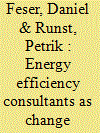| Srl | Item |
| 1 |
ID:
149912


|
|
|
|
|
| Summary/Abstract |
Residential energy consumption has been increasingly singled out by public policies as a key area for potential emission reduction. The public implementation of energy efficiency consultants (EECs) as change agents aims at the diffusion of innovation in residential building efficiency and overcoming information asymmetries in the construction sector. However, the success of these measures has been described as low. We conducted a case study involving 17 in-depth expert interviews to examine the causes of this failure in the case of Germany. In Germany, EECs are organized in a certification scheme which is prerequisite to participate in the publicly funded subsidy system. This analysis has important implications for EECs in general and hence other European countries pursuing such policies. We show that information asymmetries (ex-ante/ex-post) in the ECC market lead to a low willingness to pay. Certification of EECs does not suffice to overcome information asymmetries. We also identify a mismatch between EECs and customer incentives. As top-down policies have failed to facilitate a viable EEC market, we recommend a greater role for private and private-public networks, the cutting of EEC subsidies and a closer alignment between climate policy goals and home owners’ economic efficiency considerations.
|
|
|
|
|
|
|
|
|
|
|
|
|
|
|
|
| 2 |
ID:
077422


|
|
|
|
|
| Publication |
2007.
|
| Summary/Abstract |
The long history of experimental research on the prisoner's dilemma (PD) has primarily used a methodology that eliminates cues to participants. Researchers, however, have interpreted participants' choices as cooperative or competitive. The authors' research shows that giving participants researchers' interpretive labels of the game, the choices, and the outcomes, compared to no labels, led to significantly more cooperation; labels such as trust and cooperate/defect augmented cooperation even more. A second experiment found that independent evaluations of the labels led to perceptions that were similar to individuals' choices in the first experiment. These results suggest that we might need to rethink the import of many of our previous findings and their applicability to everyday interactions
|
|
|
|
|
|
|
|
|
|
|
|
|
|
|
|